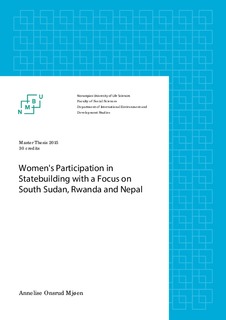Women's participation in statebuilding with a focus on South Sudan, Rwanda and Nepal
Master thesis
Permanent lenke
http://hdl.handle.net/11250/2364829Utgivelsesdato
2015-11-19Metadata
Vis full innførselSamlinger
Sammendrag
There is an understanding that statebuilding may offer important opportunities to strengthen women's rights, equality and participation. The objective of this study is to understand how gender roles affect statebuilding and how women's participation can enhance their rights and gender equality. This dissertation examines the effect that statebuilding has on women's rights and participation by examining the statebuilding efforts in South Sudan, Rwanda and Nepal. By examining these three cases, the study has looked at what has been done to include women in in the process of statebuilding and what implications this might have on women's lives. The study will also try to connect gender and statebuilding through different issues such as women's access to education, land as well as their participation in the formal processes of statebuilding.
The study has followed a literary approach that focuses on secondary sources and legal documents.
My findings indicate that the statebuilding efforts in South Sudan, Rwanda and Nepal resulted in a higher representation of women at local and decision-making levels. The findings also indicated that there are still many challenges that relates to women's rights, equality and participation, and that these challenges will not be solved unless there is more focus on the structural barriers that influence women. Amongst other, these structural barriers are customary laws, violence against women and women's access to education.

